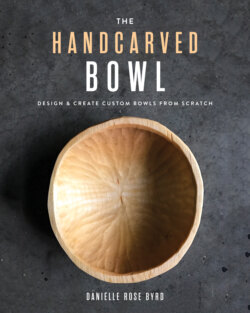Читать книгу The Handcarved Bowl - Danielle Rose Byrd - Страница 44
На сайте Литреса книга снята с продажи.
Оглавление44
T H E H A N D C A R V E D B O W L
Chapter 2 | T O O L S
Different Sweeps for
Different Work
A steeper sweep is more suitable
for roughing work, where more
material needs to be removed
quickly, somewhere around a 7, 8,
9, or 11. These will leave a deeply
scalloped texture. Shallow, flat
sweeps are great for both rough
and finish cuts and leave a more
nuanced texture. Wide gouges
offer more resistance, making
them more suitable for use with
a mallet, while narrower gouges
offer less resistance, making them
a wiser choice for paring (pushing
by hand). When the wood is dry
it is much harder to get a smooth,
finished look with a shallow gouge,
because so much of the edge is
engaged in the cut. This isn’t to say
it’s impossible, but it does require
more skill and control.
TYPES OF GOUGES
Bent gouges
These are especially good at
navigating concave spaces like the
hollows of bowls and the underside
of handles, whereas straight goug-
es are more suited to convex areas
like the underside of bowls. They
may function well in more open,
shallow bowl hollows, but their
limitations are quickly evident,
with excessive chattering.
Spoon Gouges
These specialty gouges have a
straight shaft with a curve at the
very end, along with a curved tool
edge. (J) They work well in con-
cave areas, though their straight
K
J
